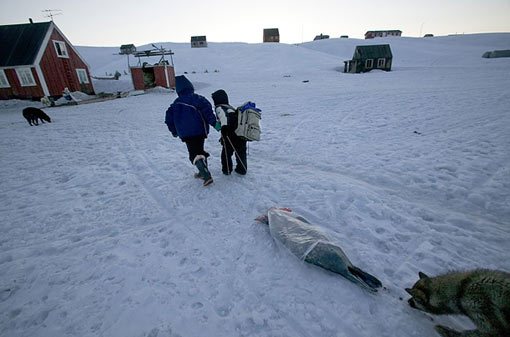You are hereBlogs / WcP.System.Thinker's blog / Bailout: Decrease financial digits in stock market? Or decrease quantity of food with increasing prices?
Bailout: Decrease financial digits in stock market? Or decrease quantity of food with increasing prices?

(quote)
Food Prices skyrocketing -
The Weekend Herald finds supermarket food prices for an “average” trolley have gone up 29% in the last year.
Now this is more than the official food price index, which is weighted to what people actually buy, but both the official and the unofficial surveys show that food inflation is strong and growing.
Wealthy nations are reneging on commitments to help feed the world's hungry and may cite the banking crisis as a reason why they cannot do more, former U.N. Secretary-General Kofi Annan told an international conference on combating starvation. Annan's address emphasized that 10,000 children in the Third World would die from malnutrition on World Food Day alone - and this should be viewed as great a tragedy as the collapse of a bank. "The financial crisis deserves urgent attention and focus. But so does the question of hunger. Millions (this year) are liable to die. Is that any less urgent?" Annan told journalists at the Fighting Hunger conference attended by 200 foreign-aid experts from Europe, Africa and the United States.

Hunger experts agreed that the current 920 million hungry worldwide is likely to grow this year to about 970 million. The deputy executive director of the U.N. World Food Program, Sheila Sisulu, said leaders should view the battle against malnutrition as linked to the struggle to keep the world's financial system afloat. Both, she said, promoted peace and stability. "This voice for the hungry and poor has to be heard simultaneously alongside the crisis of the developed world, concerned about their stock portfolios," she said.

While the world's attention has been focused on rescuing investment banks and stock markets from collapse, the global food crisis has worsened, a casualty of the growing financial tumult. Oxfam, the Britain-based aid group, estimates that economic chaos this year has pulled the incomes of an additional 119 million people below the poverty line. Richer countries from the United States to the Persian Gulf are busy helping themselves and have been slow to lend a hand.

The contrast between the rapid-fire reaction by Western authorities to the financial crisis and their comparatively modest response to soaring food prices earlier this year has triggered anger among aid and farming groups. "The amount of money used for the bailouts in the U.S. and Europe - people here are saying that money is enough to feed the poor in Africa for the next three years," said Muchiri, head of the Eastern Africa Farmers Federation.

The U.N. Food and Agriculture Organization estimates that 923 million people were seriously undernourished in 2007. Its director-general, Jacques Diouf, said in a recent speech that he worries about cuts in aid to agriculture in developing countries. He said he is also concerned by protectionist trade measures intended to counteract the financial turmoil. Although the price of commodities has come down in the past few months, Diouf said, 36 countries still need emergency assistance for food, and he warned of a looming disaster next year if countries do not make food security a top priority. "The global financial crisis should not make us forget the food crisis," Diouf said.

Commodity prices have plummeted in recent weeks as investors have shown increasing concern about a global recession and a drop in the demand for goods. Wheat futures for December delivery closed at $5.1625 on Friday -- down 62 percent from a record set in February. Corn futures are down 53 percent from their all-time high, and soybean futures are 47 percent lower. Such declines, while initially welcomed by consumers, could eventually increase deflationary pressures - lower prices could mean less incentive for farmers to cultivate crops. That, in turn, could exacerbate the global food shortage.

In June, governments, donors and agencies gathered in Rome to pledge $12.3 billion to address the world's worst food crisis in a generation. But only $1 billion has been disbursed. An additional $1.3 billion, which had been earmarked by the European Commission for helping African farmers, is tied up in bureaucracy, with some governments now arguing that they can no longer afford to give up that money. "The financial crisis is providing an excuse for people across the spectrum - governments, multilateral organizations, companies - to not do the right thing," said Oxfam spokeswoman Amy Barry.

The precarious aid situation is compounded by export taxes and bans imposed this year by a number of grain- and fertilizer-producing nations, including China, India, Pakistan, Ukraine and Argentina. E.U. Trade Commissioner Peter Mandelson has criticized export restrictions because they "drive up world prices and cut off supplies of raw materials." Such restrictions, he said, "invite a cycle of retaliation that is as economically counterproductive as it is politically hard to resist," Mandelson said last month.

The United Nations says the ongoing food crisis in North Korea could get worse due to an expected food shortfall in the near future. The international group said in a news report that the food shortfall in North Korea could potentially exceed 1.5 million tons by the end of the year, The New York Times reported. "Sadly, even though the harvest was getting better, we have had devastating floods in 2006 and 2007," report author Vitit Muntarbhorn said. "Over the past year we have had very worrying information of a very chronic food shortage." The U.N. report said more than 75 percent of all North Korean households have begun rationing food to the point that little more than half of all households eat only two meals a day.
(unquote)
Image courtesy Time, from the Book, "Hungry Planet: What the World Eats", and kiwiblog.co.nz
Original Source: Kiwiblog, AP, Washington Post, United Press International, and Time (see below)
Image Galleries: What the World Eats, Part I, Part II, and Part III


















